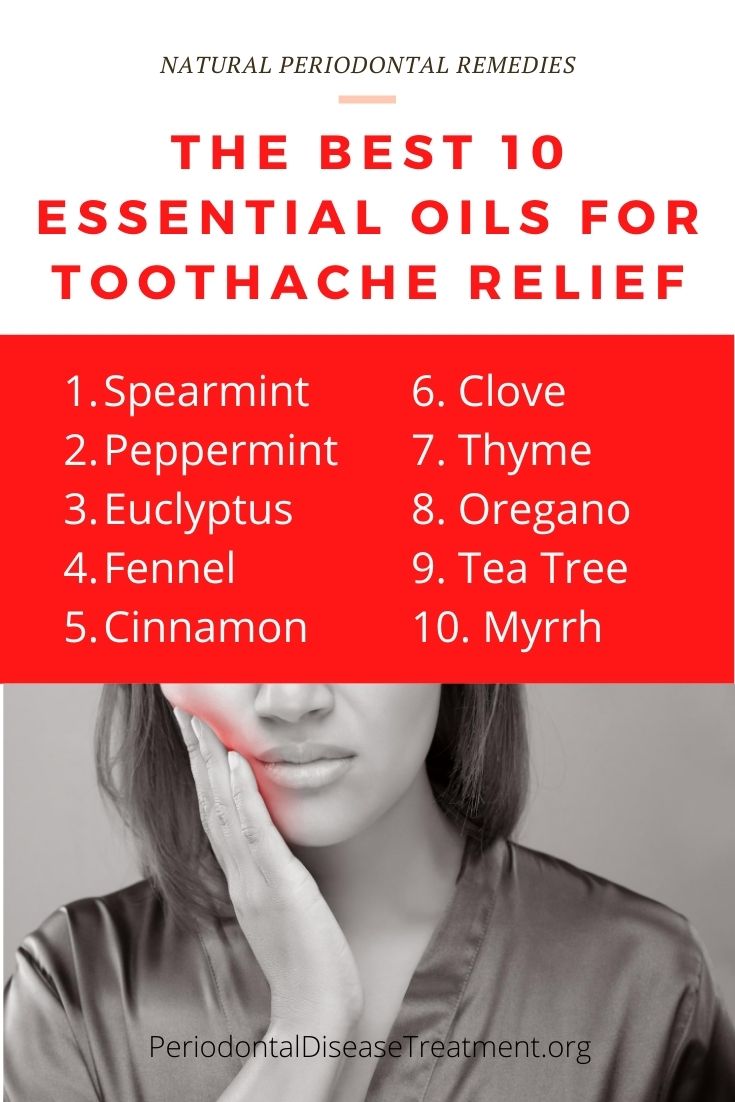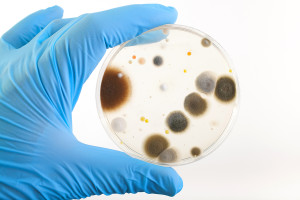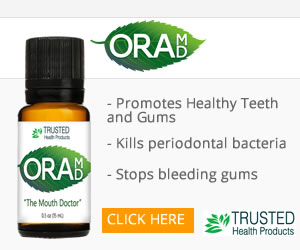Essential oils can potentially help with periodontal disease by providing antimicrobial and anti-inflammatory properties. However, it’s essential to remember that while essential oils can be used as a complementary treatment, they should not replace conventional dental care and treatment prescribed by a dentist. Here are some essential oils that are often suggested for oral health:
- Tea Tree Oil (Melaleuca alternifolia): Tea tree oil is well-known for its antimicrobial properties and can help reduce the growth of bacteria associated with periodontal disease. Be cautious when using tea tree oil, as it can be potent and should be diluted before use.
- Clove Oil (Eugenia caryophyllata): Clove oil has analgesic and antibacterial properties and can help alleviate pain and reduce inflammation. It is often used for toothaches.
- Peppermint Oil (Mentha piperita): Peppermint oil has antibacterial properties and can provide a refreshing feeling in the mouth. It may also help reduce inflammation.
- Eucalyptus Oil (Eucalyptus globulus): Eucalyptus oil has antimicrobial properties and can help reduce bacteria in the mouth. It may also have anti-inflammatory effects.
- Oregano Oil (Origanum vulgare): Oregano oil is rich in antioxidants and has antimicrobial properties. It can help fight oral bacteria that contribute to periodontal disease.
- Myrrh Oil (Commiphora myrrha): Myrrh oil has been used for its anti-inflammatory and antimicrobial properties and may be beneficial for gum health.
When using essential oils for periodontal disease, keep the following tips in mind:
- Always dilute essential oils with a carrier oil, such as coconut oil or olive oil, to avoid irritation or sensitivity.
- Use a small amount of the diluted oil and apply it to the affected area or add a few drops to your toothpaste or mouthwash.
- Perform a patch test before using essential oils to ensure you are not allergic or sensitive to them.
- Do not ingest essential oils, as some can be toxic when consumed.
- Consult with a healthcare professional or a dentist before using essential oils as part of your oral care routine, especially if you have underlying health conditions.
Remember that while essential oils may provide some relief and help maintain oral hygiene, they should be used as a complementary approach alongside regular dental care, including professional cleanings and treatments prescribed by a dentist. The top essential oils have a natural ability to kill periodontal bacteria and serve as a great natural remedy.
Periodontal disease, also known as gum disease, can manifest in various stages, from mild gingivitis to more severe periodontitis. Here are some common signs and symptoms associated with periodontal disease:
- Bleeding Gums: One of the earliest signs is often bleeding gums, especially when brushing or flossing.
- Swollen or Red Gums: Inflammation and redness of the gums can be an indicator of gum disease.
- Bad Breath: Persistent bad breath (halitosis) can be a result of bacteria in the mouth due to gum disease.
- Receding Gums: Gums that pull away from the teeth, making the teeth appear longer, can be a sign of gum disease.
- Sensitive or Loose Teeth: As the disease progresses, you may notice increased tooth sensitivity or teeth that feel loose.
- Painful Chewing: Discomfort or pain while eating, especially when chewing hard or crunchy foods.
- Pus Between Teeth and Gums: The presence of pus or discharge at the gumline is a sign of infection.
- Changes in Tooth Alignment: Shifting or moving of teeth in the mouth, which can be a result of weakened supporting structures.
- Deep Periodontal Pockets: The development of deep pockets between the teeth and gums, indicating a loss of attachment and bone around the teeth.
- Bone Loss: In severe cases, X-rays may reveal significant bone loss around the teeth.
It’s important to note that early-stage gum disease (gingivitis) is often reversible with good oral hygiene practices, such as regular brushing, flossing, and professional dental cleanings. However, if left untreated, it can progress to more severe forms of periodontal disease (periodontitis) that may require more aggressive treatments. Regular dental check-ups can help in the early detection and management of periodontal disease. If you suspect you have gum disease, it’s best to consult with a dentist or periodontist for proper evaluation and treatment.
Periodontal bacteria play a significant role in the development of periodontal disease, which, if left untreated, can ultimately lead to tooth loss. Periodontal disease is a chronic inflammatory condition that affects the supporting structures of the teeth, including the gums, periodontal ligaments, and alveolar bone. Here’s how periodontal bacteria contribute to tooth loss:
- Plaque Formation: The process begins with the formation of dental plaque, a sticky film of bacteria and food particles that accumulates on the teeth. Plaque is home to various types of bacteria, including those associated with periodontal disease.
- Bacterial Infection: Some of the bacteria in dental plaque, such as Porphyromonas gingivalis and Tannerella forsythia, can initiate an inflammatory response in the gums. These bacteria release toxins that stimulate the body’s immune system.
- Inflammatory Response: The immune system responds to the bacterial infection by releasing inflammatory mediators, such as cytokines and prostaglandins. This inflammation is the body’s attempt to fight off the infection.
- Destruction of Supporting Structures: Over time, the chronic inflammation causes damage to the gum tissue, periodontal ligaments, and alveolar bone that support the teeth. The destruction of these supporting structures is a hallmark of periodontal disease.
- Pocket Formation: As the disease progresses, the gums may begin to pull away from the teeth, creating pockets between the teeth and the surrounding tissue. These pockets provide a suitable environment for more plaque and bacteria to accumulate.
- Bone Resorption: The chronic inflammation and the presence of bacterial toxins lead to the loss of alveolar bone, a process known as bone resorption. This bone loss weakens the support for the teeth.
- Tooth Mobility: With the loss of bone and weakened support, the affected teeth may become mobile or loose.
- Tooth Loss: In severe cases of untreated periodontal disease, the teeth may become so loose and unstable that they eventually fall out or require extraction due to the inability to support them.
It’s important to note that periodontal disease is a progressive condition, and its severity can vary. Early stages of gum disease, known as gingivitis, are typically reversible with proper oral hygiene and professional dental care. However, if left untreated, gingivitis can progress to more severe periodontitis, which is associated with significant damage to the supporting structures of the teeth and can lead to tooth loss.
To prevent tooth loss due to periodontal disease, it’s crucial to maintain good oral hygiene practices, including regular brushing, flossing, and dental check-ups, to detect and address gum disease in its early stages. If you suspect you have gum disease or have symptoms like bleeding gums, gum recession, or loose teeth, it’s essential to consult with a dentist for proper diagnosis and treatment. Use natural ingredients and avoid even natural chemicals Dental health can be jeopordized with harsh chemicals. Use essential oils for healthy teeth and gums.For personal care and to avoid tooth pain or gum recession use essential oils. They kill oral pathogens and have excellent antiseptic properties.
Essential oils have been studied for their potential antimicrobial properties, including their ability to combat harmful bacteria. While research suggests that some essential oils may have antimicrobial effects against these bacteria, it’s important to note that essential oils should not be considered a sole or primary treatment for periodontal disease. They can be used as complementary or adjunctive therapies alongside proper dental care and professional treatment. Here are some essential oils that have been studied for their potential to combat periodontal bacteria:
- Tea Tree Oil (Melaleuca alternifolia): Tea tree oil is perhaps the most well-known essential oil for its antimicrobial properties. Studies have shown that it can help reduce the growth of periodontal bacteria and improve gum health.
- Clove Oil (Eugenia caryophyllata): Clove oil contains eugenol, a compound with antimicrobial properties. It has been studied for its potential to reduce the growth of periodontal bacteria and alleviate gum inflammation.
- Peppermint Oil (Mentha piperita): Peppermint oil contains menthol, which can provide a cooling sensation and may help reduce gum inflammation. It also has some antimicrobial properties.
- Cinnamon Oil (Cinnamomum zeylanicum): Cinnamon oil contains cinnamaldehyde, a compound with antimicrobial properties. Some studies have suggested that cinnamon oil may inhibit the growth of periodontal bacteria.
- Eucalyptus Oil (Eucalyptus globulus): Eucalyptus oil has demonstrated antimicrobial activity and may be beneficial for oral health. It can help reduce inflammation and bacterial growth.
- Lavender Oil (Lavandula angustifolia): Lavender oil has mild antimicrobial properties and may be useful in supporting overall oral health.
It’s important to use essential oils with caution and in a diluted form, as they can be potent and may cause irritation if applied directly to the gums. Here are some guidelines for using essential oils for oral care:
- Dilute the essential oil with a carrier oil, such as coconut oil or olive oil.
- Use a small amount of the diluted essential oil as a mouthwash or gargle. Swish it in your mouth for a short period, then spit it out.
- Do not swallow essential oils, and avoid using them undiluted.
- Consult with a healthcare professional or dentist before using essential oils as part of your oral care routine, especially if you have underlying dental conditions.
Remember that proper dental hygiene practices, including regular brushing, flossing, and professional dental cleanings, are essential for preventing and treating periodontal disease. Essential oils can be a supplementary approach, but they should not replace standard dental care.
Oil pulling is a traditional Ayurvedic practice that involves swishing oil in the mouth for a period of time, typically 15-20 minutes, and then spitting it out. While some proponents claim that oil pulling can help kill periodontal bacteria and improve oral health, the scientific evidence supporting these claims is limited, and it is not a substitute for established oral hygiene practices like brushing and flossing.
The idea behind oil pulling’s potential to kill periodontal bacteria is based on several factors:
- Bacterial Adhesion: Some oral bacteria are known to adhere to the teeth and oral tissues, forming biofilms that can contribute to periodontal disease. Supporters of oil pulling suggest that swishing oil in the mouth may help to loosen and remove these bacteria.
- Bactericidal Properties: Some oils, such as coconut oil, contain fatty acids with potential antibacterial properties. It is believed that these fatty acids can interact with and disrupt the cell membranes of oral bacteria, leading to their destruction. Try adding a drop of an essential oil mix like OraMD.
- Saliva Interaction: As you swish oil in your mouth, it mixes with saliva, creating an environment that may inhibit bacterial growth. This change in pH and the composition of oral fluids could potentially affect the growth of certain bacteria.
However, it’s important to note that while there may be some theoretical basis for these claims, scientific studies on the effectiveness of oil pulling for killing periodontal bacteria are scarce, and the results are inconclusive. More research is needed to establish whether oil pulling can be a reliable method for improving oral health.
In contrast, established oral hygiene practices, such as regular brushing, flossing, and professional dental care, are supported by extensive scientific evidence for their effectiveness in preventing and treating periodontal diseases by removing plaque and bacteria from the mouth. If you are concerned about your oral health or have periodontal issues, it is advisable to consult with a dentist or dental hygienist for guidance on appropriate oral hygiene practices and treatments.






